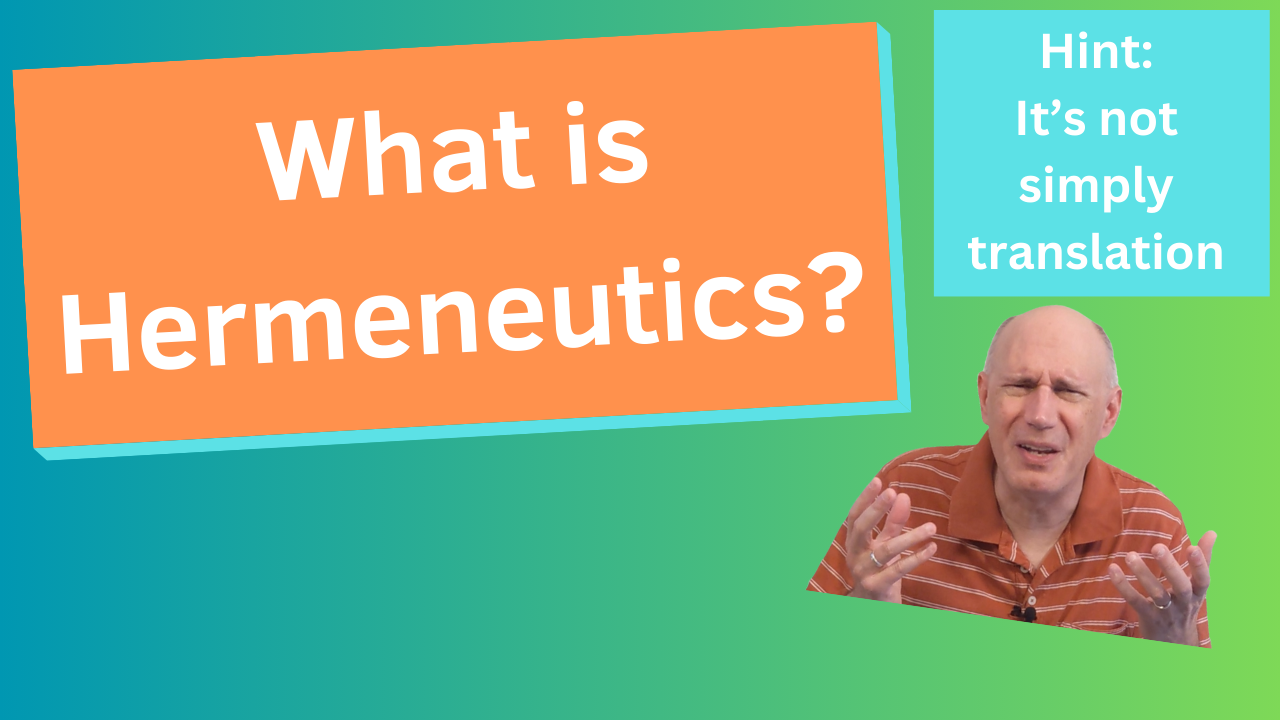01/17/2024 – What is Hermeneutics?

What exactly is hermeneutics? Hint: it’s not simple translation. Let’s talk about this. Check this out. This is TenOnReligion.
Hey peeps, it’s Dr. B. with TenOnReligion. If you like religion and philosophy content one thing I really need you to do is to smash that sub button because it really helps out the channel. The transcripts are available at TenOnReligion.com and new episodes are posted about every two weeks, around noon, U.S. Pacific time, so drop me some views.
Hermeneutics is the art of interpretation and understanding. The word comes from Hermes, the name of the Greek god who became a messenger between the gods and humanity. Hermeneutics has a long history in many cultures. In the West, it largely grew out of religious contexts, such as Judaism, Christianity, and Islam. For example, early Christian leaders during the first three to four centuries described four ways to understand scripture with each way becoming a deeper and more important meaning. These were the literal, the allegorical, the moral, and the anagogical or spiritual meaning. Fast-forward around 1200 years later and the German Protestant figure Martin Luther became famous, or infamous depending on your perspective, for his declaration of sola scriptura, only scripture as the basis for Christian faith and practice as opposed to decisions made by former or current leaders of the Roman Catholic church, the popes. There are likewise many historical examples as well regarding how to interpret from Judaism, such as Midrash, and from Islam in its oral tradition. A big change, however, happened in the late 1700’s and early 1800’s with Friedrich Schleiermacher who changed the game when he described hermeneutics as being detached from religion and began to see it as a process of interpreting and understanding all texts in a more general sense, not just religious scriptures. This led to Dilthey in the mid-1800’s to make the author the focus. The goal was to understand the author better than he understood himself with the idea that such psychological understanding would help the reader in understanding what the author wrote. But the situation would change considerably with such important thinkers that would frame the contemporary understanding of hermeneutics such as Heidegger, Gadamer, Ricoeur, and Derrida.
Heidegger’s main contribution to hermeneutics was shifting the conversation from texts to “being” in general, or more precisely his German word Dasein, “being-in-the-world.” How do we understand and interpret many things in our lives? He described this process as circular and thus it became known as the hermeneutical circle. We never start at the beginning of the story. We are always “thrown” into the middle of it. The ancient Greeks referred to this with the phrase “in media res” which means in the middle. This became a popular way to write literature in ancient Greece where the story somehow begins with the main characters already in the middle of the plot. Similarly, Heidegger states that we are “thrown” into existence. We find ourselves already in the middle of an ongoing story of humanity. This could be a family, a culture, a religion, a nation, or any number of other things. When we are confronted with something we don’t understand, we first consciously or subconsciously guess at what it might mean based on our former experiences. Heidegger refers to this as pre-understanding. The more we learn, the more meaning gets “filled in” and changes our understanding which then becomes the basis for the next time we are confronted with something we don’t understand. There is no way to escape the process and somehow step outside of the circle. We are always in it. If you put this back into the religious context of understanding a passage of scripture, for example, it’s not simply translation or linguistics. It’s a much larger process of understanding. There are many things that come before us which shape or frame or color all the possibilities in which we could possibly understand or interpret any given passage of scripture and there’s no escaping that. This is why hermeneutics is so important because there are only interpretations.
Gadamer, who by the way was born in 1900 and lived until 2002, highlighted the idea of human finitude. His key concept was that of a horizon. Our knowledge and experiences of belonging to a history, culture, tradition, religion, and language always effects, or generates, our horizon of meaning, including the possible ways in how we think and the possible types of questions we might ask. Our “consciousness” is “effected” or molded and shaped as a result of this historical process of understanding without us really realizing it. He referred to this as historically-effected consciousness. Our interpretation of the past is made possible by our historically-effected consciousness because we are always already part of the history that we set out to interpret. Just like the ancient Greeks, our story always starts in media res. To understand a text, a person, an event, or a work of art from the past means to translate it into our situation. It means to hear in it as an answer to the questions of our horizon. Gadamer called this the “fusion of horizons.” Since our understanding is always finite and historical, we necessarily understand differently than any original author or original audience of a text.
Paul Ricoeur explains this well when he stated that hermeneutical understanding today requires that religious texts be decontextualized, that is, detached and abstracted from their original contexts, and then recontextualized so that their messages remain alive. When one experiences any ancient text, be it religious or not, one comes to the realization that they cannot relate to that world of meaning. They don’t live within the context of that time and era. The rules of language were different. The ideology was different. Their horizons were different. One uses the creative tension between the past and the present to give birth to a new understanding related to the questions the reader is asking today.
Derrida, who is dependent a lot on Heidegger, further described how people use language, a process known as deconstruction. He wrote there is no “outside of the text,” or more precisely, no such thing as “out of the context” because meanings of words are always in flux and change when the context changes. We are always in the hermeneutical circle. Meanings of words and texts are shifting targets perpetuated through time in different ways based on different contexts, or to use Gadamer’s word, different horizons. The only thing we can do is try and discover why certain decisions were made regarding meaning since interpretation is a characterization of the way our minds process information.
A lot of this then becomes political in a sense. Let me explain. When people try to understand something new, they search for an authority to consult on the matter. What’s an authority? A political document, a religious text or scripture, Wikipedia, a biased news media outlet, a social media platform, our best friend? Why do we believe one authority and not another? Who gets to decide and on what basis are those decisions made? That just sounded cool the way I said that. Who gets to decide and on what basis are those decisions made? So, it’s political in the sense of power. It’s not just who or what has enough power over us such that we believe in their authority enough to adopt their view, it’s explaining the entire process of why and how that happens. Why and how do we come to understand what the options are, and then choose one understanding among a range of competing options? That starts to really get at answering the question, “what is hermeneutics?”, the art of interpretation and understanding.
So, what do you think about the explanation of what is hermeneutics? Leave a comment below and let me know what you think. Until next time, stay curious. If you enjoyed this, support the channel in the link below, please like and share this video and subscribe to this channel. This is TenOnReligion.


